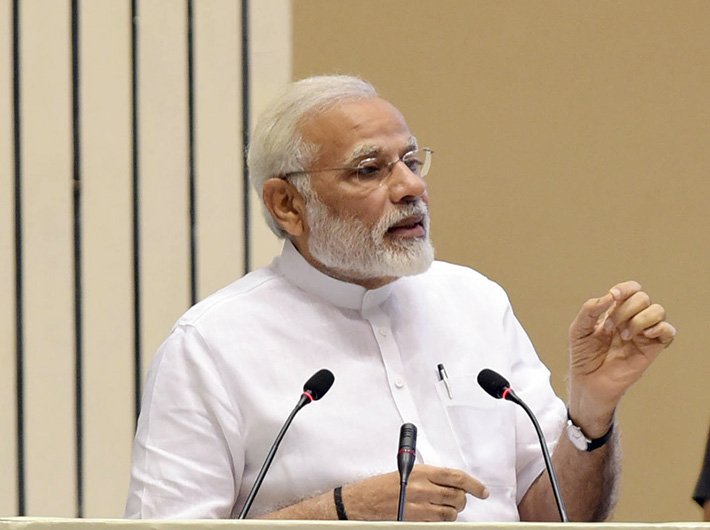Political observers have consistently painted Prime Minister Narendra Modi’s actions as being borne out of a dogmatic ideology. But the reshuffle-cum-expansion of the Union Cabinet on Sunday is the latest event that suggests exactly the opposite. Modi, an erstwhile Rashtriya Swayansevak Sangh (RSS) pracharak (full-time worker), has shown that as far as the interests of good governance are served, dogma and ideology can wait.
That is the clear message the emanates from the composition of the new members of his team, quite a few of whom are neither dyed-in-wool Sanghis (members of the RSS fraternity) or known Modi cheerleaders. They have been picked with very specific governance — and, of course, political — goals in mind.
Those who know Nirmala Sitharaman can vouch for the fact that her initiation to the RSS ideology began much after her student life. Puritans within the RSS fold would actually have reasons not to be entirely convinced of her ideological commitment. Sadhvi Uma Bharti and Sadhvi Pragya stand a better chance in comparison. Yet Sitharaman finds herself in the exalted space of the Cabinet Committee on Security (CCS) which is the apex decision-making body on critical issues of governance. Sitharaman was rewarded for her performance, diligence and dignified conduct and not for her ideological proclivity.
Similarly, bureaucrats like RK Singh, Satyapal Singh, Hardeep Puri and Alphons Kannanthanam who were inducted into the Narendra Modi Cabinet can't even remotely be accused of having even tenuous links with the Sangh Parivar’s ideology. On the other hand, the manner in which Singh arrested LK Advani in Samastipur in 1991 during the Rath Yatra, boast of his bureaucratic credentials. As home secretary, Singh was seen as pursuing the case of "Hindu terror" vigorously from the North Block. But what mattered more for Modi was his reputation as an efficient officer who delivered a high class road infrastructure in Bihar.
Hardeep Puri’s stint as the ambassador of India to the United Kingdom drew him close to the Atal Bihari Vajpayee government. But he was equally at ease with leaders in the UPA government. Known as a highly efficient diplomat, Puri’s induction into the council of ministers is expected to give a fillip to India's exposure to international institutions and capital. Kannanthanam is similarly known for being a stickler for rules and for his proficiency in project delivery.
In these exercises, there emerges a clear pattern: Modi is hardly bound by any dogmas. The Cabinet expansion is just the most recent example in a consistent thread of actions that show that Modi can look beyond dogmas and dislikes. The picking of Ram Nath Kovind as the President of India and the patch-up with Bihar chief minister Nitish Kumar illustrate that. In the case of Kovind, it did not matter that his ideological connection with the Sangh Parivar was quite tenuous. Kovind, though a Dalit, is not a radical Ambedkarite. Yet, Modi, in his cabinet, gives space to a radical Ambedkarite like Ramdas Athawale.
The way Modi seamlessly facilitated the transition of Kumar from the Mahagatbandhan into the NDA’s fold on 26 July is stunning for its lack of animus after all that transpired between the two leaders between 2013 and 2017. It would be naïve to look at this transition from the prism of rhetorical politics alone. Kumar is not an ordinary leader. He gave the BJP a body blow in the 2015 Assembly elections in Bihar. And he vowed to free India of the RSS and rhetorically coined the term “Sangh-mukt Bharat” to counter Modi's "Congress-mukt Bharat".
Now juxtapose Kumar’s arrival into the NDA fold with the installation of Yogi Adityanatah — the presiding head of Gorakhdham religious peeth and a fire-breathing Hindu nationalist — as the chief minister of the country’s most populous state a few months earlier. Kumar and Adityanath are polar opposites, yet both exist under the umbrella of the NDA led by Modi.
Perhaps for the first time after 1950’s when Congress included in its fold different and often mutually contradictory strands, BJP has expanded the range of the political spectrum enormously under Modi. In the post-independent phase, Congress was an umbrella organisation which included political streams running counter to each other. Congress gradually lost this unique inherent characteristic after 1970 during Indira Gandhi’s tenure. With BJP emerging as a powerful principal pole of Indian politics, Modi’s pragmatism expands the BJP’s area of influence without getting itself bound by dogmas of ideology.
Those familiar with BJP and its earlier avatar — Bharatiya Jana Sangh — are aware that the party’s ideologues had always had difficulty in striking a balance between the Sangh Parivar’s core dichotomy — traditionalism versus modernity. BJP ideologue KR Malkani aptly summarised it, saying that “the good governance of Bharat depends directly and fully on the formation of a nationwide party which will be as much revivalist of ancient values as it will be futurist in its target”.
Modi, quite contrary to his perceived image as a dogmatic ideologist, seems to be navigating that dichotomy rather deftly.
[This article originally appeared on FirstPost.com]

